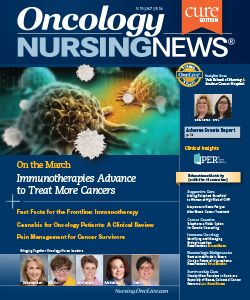On the March: Immunotherapies Advance to Treat More Cancers
Immunotherapy is changing the cancer treatment game as therapies continue to be approved for more and more tumor types. This creates more responsibilities for oncology nurses.
Immunotherapies Advance to Treat More Cancers

Cancer immunotherapies, once approved to treat a limited number of cancers now hold FDA approvals for the treatment of more tumor types, among them lung, kidney, and bladder cancers, Hodgkin lymphoma, and most recently, head and neck cancer. These game-changing therapies are also being investigated and showing promising early signals of efficacy in even more settings, such as glioblastoma and thyroid cancer.
These tremendous strides are offering new hope for many patients, but also new responsibilities for the oncology nurses supporting them in the clinic. As the first line of defense for patients in managing treatment-related side effects, nurses need to understand and educate their patients about how immunotherapies work against their cancer and what immune-related adverse events (irAEs) to expect.
New FDA Approvals in Immuno-Oncology
Just in the last several months, the FDA has approved a number of immunotherapies and expanded indications across multiple tumor types.
Bladder Cancer
With the recent FDA approval of atezolizumab (Tecentriq), coupled with the breakthrough therapy designation of nivolumab (Opdivo), the field of metastatic bladder cancer—an area that had long been stagnant—has quickly evolved with immunotherapy coming to the forefront.
Nivolumab was granted the designation in June as a potential treatment of patients with unresectable, locally advanced, or metastatic urothelial carcinoma (mUC) after the failure of a platinum-containing regimen.
The FDA granted atezolizumab an accelerated approval in May, following encouraging phase II findings in the IMvigor 210 study. The indication is for patients with locally advanced or mUC whose disease progressed during or after platinum-based chemotherapy, or within 12 months of receiving platinum-containing chemotherapy, either before or after surgery.
Adverse events: The most common adverse reactions observed with atezolizumab (≥20% of patients), according to the FDA, were fatigue, decreased appetite, nausea, urinary tract infection, pyrexia, and constipation. Grade 3/4 AEs were seen in 50% of patients. The most common grade 3/4 AEs included urinary tract infection (9%), anemia (8%), fatigue (6%), dyspnea (4%), and hematuria (3%). Infection and immunerelated AEs were also seen with atezolizumab.
Head and Neck Cancer
Marking an important step forward for patients with recurrent or metastatic head and neck squamous cell carcinoma (HNSCC), the FDA granted an accelerated approval in August to pembrolizumab (Keytruda) for patients who progressed on a platinum-based chemotherapy.
The FDA’s approval was based on objective response rates (ORR) in the phase Ib KEYNOTE-012 study. In that analysis, the ORR with pembrolizumab was 16%, which included a complete response rate of 5%. Responses lasted for ≥6 months for 82% of patients.
Adverse events: Safety data were evaluated in 192 patients with HNSCC receiving at least 1 dose of pembrolizumab 10 mg/kg every 2 weeks or 200 mg every 3 weeks. The most common (≥20%) adverse reactions were fatigue, decreased appetite, and dyspnea. Adverse reactions occurring in patients with HNSCC were similar to those occurring in patients with melanoma or non—small cell lung cancer (NSCLC), the FDA reported, with the exception of an increased incidence of facial edema (10% all grades, 2.1% grades 3/4) and new or worsening hypothyroidism (14.6% all grades).
Hodgkin Lymphoma
Nivolumab received an accelerated FDA approval in Hodgkin lymphoma in May, marking the first PD-1 inhibitor approved for a hematologic malignancy. The FDA approval applies to patients whose classical Hodgkin lymphoma (cHL) has relapsed or progressed after autologous hematopoietic stem cell transplantation (HSCT) and posttransplantation brentuximab vedotin (Adcetris). This approval was based on an ORR of 65% (n = 62) in 95 patients enrolled in 2 single-arm trials of nivolumab in patients with relapsed or refractory cHL.
“[Nivolumab] is the second drug in history to be approved for patients with relapsed Hodgkin lymphoma,” explained Anas Younes, MD, chief
of the Lymphoma Service at Memorial Sloan Kettering Cancer Center. “In addition, within this indication, nivolumab produced the highest response rate compared to any other cancer. More importantly, it seems that nivolumab can be combined with brentuximab vedotin at full doses of each agent, creating an excitement about the potential for changing the future therapy of Hodgkin lymphoma.” (For more on adverse events with nivolumab in this setting, click here).
Renal Cell Carcinoma
Based on an extension in overall survival (OS) in the CheckMate-025 trial, the FDA approved nivolumab to treat patients with metastatic renal cell carcinoma (RCC) following prior treatment with an antiangiogenic therapy. Median overall survival (OS) was 25.0 months in the nivolumab arm and 19.6 months with everolimus (Afinitor). The confirmed response rate was 21.5% with nivolumab versus 3.9% in the comparator arm. The median response duration was 23.0 months with nivolumab and 13.7 months with everolimus. Median progresion-free survival (PFS) was 4.6 and 4.4 months with nivolumab and everolimus, respectively.
Adverse events: Safety was evaluated in 406 patients who had previously received at least one antiangiogenic therapy. The most common (≥20%) adverse reactions included asthenic conditions, cough, nausea, rash, dyspnea, diarrhea, constipation, decreased appetite, back pain, and arthralgia.
The most common (≥30%) laboratory abnormalities which worsened compared with baseline included increased creatinine, lymphopenia, anemia, increased AST, increased alkaline phosphatase, hyponatremia, elevated triglycerides, and hyperkalemia.
Serious AEs were reported in 47% of patients, the FDA reported. The most common serious AEs (≥2%) were acute kidney injury, pleural effusion, pneumonia, diarrhea, and hypercalcemia.
Expansions in Established Settings
Immunotherapies are also widening their reach in areas where they have already been successful, such as lung cancer and melanoma.
Lung Cancer
Researchers are looking to build upon their successes with both pembrolizumab and nivolumab in the treatment of non—small cell lung cancer (NSCLC).
Nivolumab is FDA-approved for patients with nonsquamous NSCLC who progress on or following platinum-based chemotherapy, or EGFR- or ALK-targeted agents in patients with these mutations. For patients with squamous cell NSCLC, nivolumab is approved for those who have progressed on or after platinum-based chemotherapy.
Pembrolizumab is approved by the FDA as a treatment for patients with advanced NSCLC across all histologies that express PD-L1 on ≥50% of cells. The indication is for patients who progressed on or after platinum-containing chemotherapy or EGFR- or ALK-targeted agents in patients harboring those mutations.
Combining immunotherapy with chemotherapy, molecular therapy, or antiangiogenic therapy has shown promising results in recent randomized trials of patients with lung cancer, although none of the combinations have yet to demonstrate clear superiority.
Recently announced results from the phase III OAK trial add to a growing body of evidence that supports the role of atezolizumab as a potential new treatment for specific types of advanced NSCLC. In that trial, atezolizumab improved survival compared with docetaxel in patients with advanced NSCLC following failure of platinum-based chemotherapy. The survival benefit was observed regardless of PD-L1 status, and the safety profile for atezolizumab in the OAK trial was consistent with previously reported toxicity data for the drug.
Melanoma
Immunotherapy with agents such as nivolumab and ipilimumab (Yervoy) propelled the field of melanoma forward, but researchers are still actively seeking how to optimally use these checkpoint inhibitors.
Specifically, ongoing research is exploring single-agent versus combination use of nivolumab and ipilimumab, as well as the ideal sequencing approach for the two drugs. At this point, combination regimens have proven highly effective, according to Yvonee Saenger, MD, the director of Melanoma Immunotherapy at Columbia University Medical Center. “Thus far, it really seems that the more immunotherapy the better. It is likely that the more we pile these agents together, the better response rates we will get.”
Recently, the combination of the oncolytic virus talimogene laherparepvec (T-VEC) and pembrolizumab demonstrated evidence of clinical benefit, as well as an acceptable safety profile when the treatment regimen was administered at full doses, in patients with advanced melanoma, according to results of the phase Ib MASTERKEY265 study.
Looking Ahead—More to Come
With such a track record, immunotherapies not surprisingly are being explored to treat many other cancers, and encouraging findings from some of these trials were featured at the 2016 annual meeting of the American Society of Clinical Oncology.
Single-agent nivolumab demonstrated encouraging signs of activity with a mild AE profile for patients with recurrent glioblastoma multiforme (GBM), and preliminary safety data from another ongoing trial showed that a combination of pembrolizumab and bevacizumab (Avastin was safe and tolerable in this setting.
Responses also are being reported with pembrolizumab for some sarcoma subtypes. A number of clinical trials have been examining the potential of novel immunotherapy agents in the field of gastric cancer.
Pembrolizumab also demonstrated promising antitumor activity with durable responses in patients with advanced thyroid cancer. And, in patients with high microsatellite instability colorectal cancer, the immunotherapy combination of nivolumab and ipilimumab showed encouraging activity in phase II research.
Prostate cancer was one of the first areas where immunotherapy made its mark with the immuno-based agent sipuleucel-T (Provenge), and now studies are underway examining T-cell checkpoint blockade strategies in this setting. Clearly, immunotherapy is here to stay. Nevertheless, challenges remain in how best to deploy these therapies, including figuring out who is going to respond, because unfortunately not all patients do respond. An important job for researchers, too, will be to determine the ideal length of treatment and when some of these therapies need to be combined with other treatments.
The nurse’s role in supporting patients receiving these treatments remains crucial and constant: ensure that patients understand what to expect, how these therapies work, and why it’s so important that they and their caregivers alert their providers to symptoms that may signal an irAE, so prompt action can be taken to achieve the best outcomes.
Moving Promptly to Manage irAEs
Proactively identifying and assessing immune-related adverse events (irAEs) among patients receiving immunotherapies in the outpatient setting is essential to prevent possibly life-threatening complications and avert the need for inpatient management.
To help address this challenge, Memorial Sloan Kettering (MSK) Cancer Center established a dedicated ambulatory immunotherapy clinic for patients participating in phase I clinical trials.
Clinical research nurses at MSK use an evidence-based algorithm to classify symptoms and assess their severity, provide appropriate symptom management, and then either start (manage symptoms while continuing the patient’s immunotherapy), pause, or stop the immunotherapy depending on the grade of the patient’s irAE.
Nurse-delivered patient education is a core component of the initiative, so that patients recognize what symptoms to look for and understand the importance of alerting their clinicians early.
Reporting on the intervention at this year’s ONS Annual Congress, the nurse-led research team said that with “utilization of a dedicated collaborative team to provide education, thorough clinical assessment, early intervention and early algorithmic interventions, patients can be managed safely and successfully.”
Gordon R, Kasler M, Stasi K. Start, pause, stop: a dedicated ambulatory phase I immunotherapy clinic’s approach to managing patients on immune modulators. Oncol Nurs Forum. 2016; 43( 2):6.



